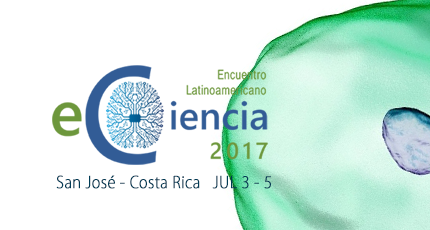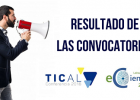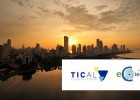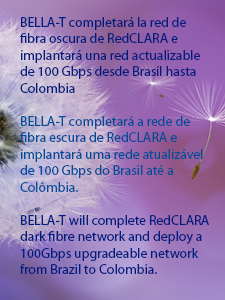
O Encontro Latinoamericano de eCiência BELLA-T (a realizar-se juntamente com TICAL2017, em San José, Costa Rica, entre 3 e 5 de julho) busca oferecer um novo espaço para o intercâmbio de conhecimento e boas práticas no uso das Tecnologias da Informação e Comunicações (TIC) no âmbito da pesquisa, com vistas a contribuir com a melhoria e a otimização da gestão e do trabalho dos grupos científicos da região.
Com este objetivo, convoca os pesquisadores latino-americanos a apresentarem trabalhos que exponham suas experiências no desenvolvimento de iniciativas colaborativas que envolvam o uso das TIC (redes avançadas, bases de dados, repositórios, visualização, supercomputação, entre outros) nas áreas de Biodiversidade, e-Saúde, Meio Ambiente, Astronomia, Arte e Cultura em Rede e Física de Altas Energias, consideradas prioritárias.
Espera-se que os trabalhos apresentem uma experiência que permita conhecer pelo menos os seguintes aspectos:
- O impacto da pesquisa desenvolvida.
- TICs empregadas no desenvolvimento da pesquisa e a descrição do apoio e/ou contribuição dada para o cumprimento do objetivo da pesquisa.
- Descrição da rede de colaboração que participou do projeto.
- Descrição da experiência adquirida para construir as equipes e as estratégias de colaboração no projeto, particularmente entre os pesquisadores e os especialistas em tecnologias (experiências aprendidas).
Temáticas Prioritárias
Nota: Os temas que se apresentam nas áreas prioritárias a modo de exemplo não excluem outros que podem ser apresentados pelos pesquisadores que desejem postular a esta convocatória.
1. Biodiversidade: Definição de necessidades e padrões de infraestrutura para incrementar o monitoramento global; experiências na implementação de Darwin Core, dados abertos e os novos enfoques para a publicação de dados; Qualidade dos dados, problemas, métodos e ferramentas; Padrões e semântica de dados para Biodiversidade; Visualização de dados para a obtenção de conhecimentos úteis e análises de dados; Melhores práticas para a implementação de serviços de informática de Biodiversidade.
2. e-Saúde: Tecnologias móveis para redes de pesquisa; Laboratórios Virtuais para Saúde; Cirurgia Digital; Serviços de inovação de produtos em e-Saúde/Telesaúde; Pesquisa em campos específicos e especialidade de medicina; Registro médico eletrônico; Os sistemas para a educação em Saúde baseada em imagens médicas; Colaboração audiovisual em entornos de Saúde; Pesquisa plataforma da rede de Saúde; Entornos informáticos para a pesquisa em Saúde.
3. Meio Ambiente: Vulcanismo e Tectônica de Placas; Neotectônica e Sismologia; Mudanças climáticas; Deslizamento e Geotecnia; Gestão do Risco; Gestão de Ecossistemas; Uso e gestão da água, clima e ar limpo; Uso eficiente de recursos.
4. Astronomia: Exoplanetas e Vida extraterreste: a busca e a caracterização de planetas extrassolares; Transientes: explorando o “Time domain” em Astronomia; Energia Escura, Matéria Escura, e Cosmologia: Buscando sinais fracos em dados massivos; Astroinformática: Impactos da Informática na era do Big Data na Astronomia.
5. Arte e Cultura em Rede: Experiências universitárias, projetos universitários em spin-off e centros de desenvolvimento criativo, que promovam, fomentem, divulguem e exibam as práticas culturais e processos criativos articulados às tecnologias (videogames, animação transmídia, cine digital, cine expansivo, realidade aumentada e virtual, nos quais se “co-desenham” e “co-criam” conteúdos digitais); Interrelação entre Ciências, Artes e Tecnologias (artes visuais, música eletrônica, literatura, performances, dança eletrônica, entre outros); A Estética em produção digital, a epistemologia da imagem e as artes eletrônicas.
6. Física de altas energias: Aceleradores de partículas: Além do modelo Standard; Colaborações América Latina – CERN; Detectores (resistive plate chambers, water Cherenkov detectors, photomultipliers, etc); Análise, griding e mineração de dados; Machine learning; Aplicações à física médica; Astropartículas e física de raios gama; Redes de simulação para chuvas atmosféricas extensas; Colaborações na América latina; Raios cósmicos ultra energéticos; Física de neutrinos; Gamma Ray Bursts; Matéria Escura; Fundamentos da física de altas energias; Mecanismos de aceleração de partículas; Cosmologia em TeV; Cosmologia em branas; Supersimetrias.
Material que os postulantes devem preparar:
- Uma apresentação de, no máximo 20 minutos, que mostre a experiência desenvolvida em todas as suas etapas.
- Um resumo com uma extensão mínima de 3 e máxima de 8 páginas, que descreva o trabalho realizados e seus resultados.
Os idiomas oficiais são o espanhol e o português. É necessário que, além disso, se envie uma cópia do resumo do trabalho em Inglês.
Quem está convocado a participar:
A convocatória está dirigida aos grupos de pesquisadores trabalhando nas áreas definidas como prioritárias – indicadas anteriormente – cuja experiência envolva o uso de TICs (redes avançadas, bases de dados, repositórios, visualização, supercomputação, entre outros) como apoio ao trabalho de pesquisa.
Benefícios para os trabalhos selecionados:
O Projeto BELLA-T custeará o translado de um dos pesquisadores responsáveis pelo trabalho selecionado até o lugar que sediará o encontro, além de sua participação e hospedagem.
Convocatória para apresentação de trabalhos:
Se convida a apresentar trabalhos preferencialmente sobre as temáticas descritas anteriormente, enviando suas propostas para Este endereço de email está protegido contra piratas. Necessita ativar o JavaScript para o visualizar. indicando no assunto do e-mail: Propuesta para la Convocatoria de Trabajos - Encuentro Latinoamericano de e-Ciencia
Datas importantes
16 de março: Início da Convocatória
24 de abril: Término da Convocatória
22 de maio: Notificação dos autores selecionados
3-5 de julho: Encontro Latinoamericano de e-Ciência – San José, Costa Rica























